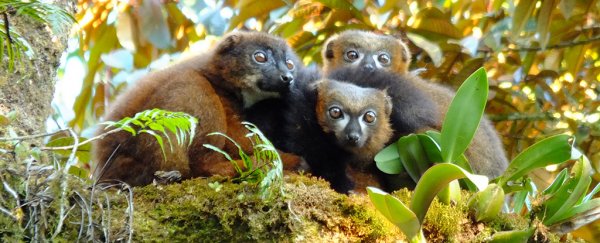Researchers have shown that the health of red-bellied lemurs could be improved by close contact and huddling, a finding that might have something to say about the health benefits of physical touching in humans as well.
While scientists already knew there were benefits to sharing germs among group members, this study looked into the link between social dynamics (such as cuddling) and the spread of helpful gut bacteria.
What they found is that the closer these animals get to each other, the more their microbes are shared, and over time this synchronisation could work into a cooperative immunity against unfamiliar sources of infection.
As far as humans go, the researchers says, getting up close and personal with each other could sync our gut microbes and might also be enough to ensure we're collectively ready for whatever new pathogens might appear in our population.
"In close social groups like red-bellied lemurs, social environment is key to immunity," says one of the team, Aura Raulo from the University of Oxford in the UK.
"Sharing microbial allies and enemies makes infections by opportunistic pathogens less likely."
Gut microbes are important in humans and animals alike, responsible for fine-tuning the immune system and helping the digestive process. When something goes wrong with our gut bacteria, a host of health issues can follow.
Here, the researchers looked at faeces samples from 36 red-bellied lemurs in Ranomafana National Park in Madagascar.
Lemurs are known to be a very tactile, social type of animal, and they spend a lot of time together in groups, making them perfect for this type of study.
Sure enough, the samples showed that the gut microbiomes of lemur groups were "markedly similar", with close friends within those groups also showing signs of sharing similar gut bacteria.
Similar results have been seen in other animals, including baboons, and it's known to happen in humans too.
"The gut microbiome of red-bellied lemurs most closely resembles that of their group members," explains one of the researchers, anthropologist Andrea Baden from the University of Oxford.
"They are extremely cohesive and in contact a great deal, and rarely if ever interact with other groups, so this makes sense."
The team was able to work out who had been in contact with whom in the lemur community just by looking at the gut bacteria, and suggest this acts as a safety measure for the community that might also apply to humans.
In fact scientists have previously suggested actions like cuddling and kissing might have evolved in part to keep us healthy, and intimate kissing is definitely one method by which we share bacteria with each other.
Both genetics and a host of other factors, including diet and stress and who we come into close contact with, are known to influence the human microbiome.
"When people with different gut microbiomes interact, they share their symbiotic bacteria through touch," says Raulo.
"This bacterial transmission can make us more or less healthy, depending on how compatible our guts are with our friends."
"For example, I might host a bacteria in my gut that is well-behaved, and fits my symbiotic gut community, but might turn out to be an invasive pathogen in another person who is not accustomed to it."
However, more research needs to be done to prove the link between close contact, gut bacteria synchronisation, and better health.
Right now a lot of the microbes the researchers studied are unknown to science, so they can't say whether they're good or bad bacteria – just that the bacteria match up.
If further tests can show the way that a shared mix of microbes can keep us better protected against illness, we've got one more reason to cuddle up more often.
There's still a long way to go though before we've unlocked all the mysteries of gut bacteria.
"It is important to understand what builds up a healthy gut microbiome, and the role that the wider social and ecological environment plays in this," says Raulo.
"Understanding that social environment and stress are directly linked to gut microbiome, could go some way to explaining why the western world experiences so many epidemics of autoimmune diseases, and help us to better treat people with them."
The findings have been published in the Journal of Animal Ecology.
